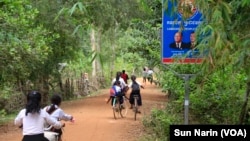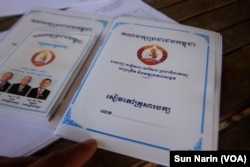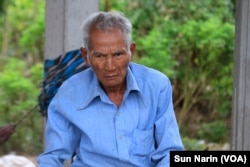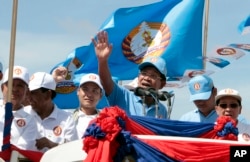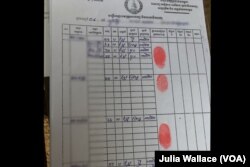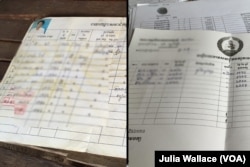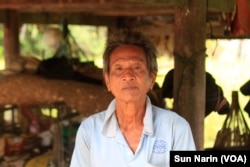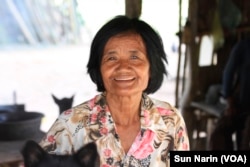The ruling Cambodian People's Party has seemingly never had a firmer grip on power.
The CPP dominates government administration, the military and the judiciary, and has eliminated or outlasted all of its political opponents.
But its apparent supremacy masks a serious and growing problem: The more control the party exerts, the less certainty it has about whether anyone truly supports it.
As it moves to further consolidate its power in the run-up to the July general election, the government is preying on some superstitious segments of the population and manipulating the trust many villages place in local officials. And as this plays out, the government has drawn international concern due to the continued detention of Kem Sokha, the leader of the political opposition, the subsequent flight of opposition leaders, and a crackdown on nongovernmental organizations and media.
On Tuesday, after a U.S. delegation met with Cambodian Foreign Minister Prak Sokhonn in Manila, on the margins of the East Asia Summit, the White House issued a statement expressing "strong concerns about recent steps that challenge the country's democratic progress, including restrictions on the free press, civil society, and the political opposition."
On the ground
Here in Taches, a group of rice-farming villages bisected by a new national highway, Duch Thuon embodies the contradiction facing the CPP, where it can wield its influence more directly than in urban areas.
The 66-year-old used to support the ruling party, but a decade ago began backing the opposition after becoming angered by government corruption.
But when his village's deputy chief and a CPP-aligned councilor came to his home last month and asked him which party he would vote for, he knew the right answer.
"The party that gives life," he told the visitors, using a politically correct term for the CPP.
Nationwide, the CPP has worked for decades to blur the boundaries between itself and the state. Projects paid for by state funds or external donors are often attributed to the CPP's largesse. Villagers are told, repeatedly, that the party "gives life."
Given that military officials and local leaders who control access to state services are also CPP affiliates, citizens may find it hard to reveal their true political preferences when asked.
"Because I live under their authority, when they came to ask, I just followed them. But in my mind, my heart, it is not that way. I'm actually voting for the CNRP," said Duch Thuon in an interview last week, referring to the opposing Cambodia National Rescue Party.
This can create the false impression that the CPP is universally liked, which complicates the fundamental business of democracy — winning elections.
Supporting the CPP
In response to disappointing results in June's commune elections, the CPP has embarked on an ambitious new membership campaign to register entire households as "CPP families" and ensure that everyone who signs up is smos trong — a Khmer term meaning "honest" or, literally, "straight and loyal."
Party administrators want to identify people who will actually tick the box for the CPP once they get inside the voting booth, which is increasingly the only place in Cambodia where true political inclinations can be expressed.
The rationale behind the drive was laid out in a party document circulated on June 7 and signed by Prime Minister Hun Sen. Three days earlier, more than 3.5 million people had cast votes for CPP commune councilors. But the party has more than 5.3 million members.
Hun Sen exhorted local officials to re-register supporters, this time making sure that each one of them would truly vote for the party. The campaign's slogan is "One Party Member, One Vote Supporting the CPP."
"It is since we lost 2 million votes, so we have to selectively choose for quality, which refers to people who are completely honest with the party," party spokesman Sok Eysan told VOA Khmer.
In this part of Kampong Chhnang province, the registration drive has seen village chiefs go door to door, asking residents like Duch Thuon to register for a new document called a "CPP family book."
It looks similar to a key Cambodian state identity document also known as a family book. Unlike previous party registration cards, the book requires affiliates to provide photographs of their faces.
Those who register as "CPP families" are to be given a cash payment three times per year, according to documents viewed by VOA. However, they are expected to vote for the CPP, multiple local officials and villagers said.
Feeling pressured
Multiple interviewees told VOA that they felt pressure, implicit or explicit, to register for the document, or to agree to be included in a parents' or husband's CPP family books, since the same local officials asking them to sign up were the ones responsible for processing normal identity and land ownership documents.
"There is confusion," said Sun Kosal, a commune councilor for the opposition Cambodia National Rescue Party in Taches. "People are asking around: 'What is it for?'"
Everyone interviewed by VOA said they were asked to thumbprint and add their photographs to a CPP family book by their village chief or deputy chief, even though village administrators are not supposed to engage in party politics.
Village officials have been instructed to ensure that every CPP family genuinely supports the party, but they also report being under pressure by higher-level officials to boost the numbers.
This has resulted in some unusual efforts to ensure that those on the CPP family list show up in the polling booth in July and tick the party box.
Everyone who signs up is also assigned to a "party group," a cell of about 10 people who are assigned to monitor each other's loyalty. Some village chiefs in Taches say they were told to make registrees swear an oath that would bring death upon them if they did not vote for the CPP.
CPP spokesman Sok Eysan said that although the registration drive was a national initiative, provincial officials were given latitude to implement it. He said it was not official party policy to have people swearing oaths or to pay new members, but those actions were allowed.
"It depends on the ability of each provincial head," Sok Eysan said.
In an indication of how sensitive the issue is, the party spokesman cautioned a VOA reporter that asking detailed questions about the registration drive might be a sign that the journalist was supporting a "color revolution" — a reference to pro-democracy movements' attempts to overthrow autocratic regimes in parts of the former Soviet Union, the Balkans and the Middle East.
A water pledge
Before the June elections, the chief of Boeng Kak village in Taches took a straw poll. The responses indicated that the CPP would win the vote.
The opposition then won by about 80 votes.
That is why identifying "smos trong" CPP supporters is so important, said Nget Vanna, a former soldier who became village chief about five years ago.
He has instituted a "water pledge." After registering villagers for CPP family books, he asked a Buddhist monk to bless a bottle of water that he toted from house to house, testing those who had professed support by asking them to drink the water and take an oath.
The oath-takers were asked to swear that if they did not vote for the CPP, they would meet with death and destruction, he said. They were allowed to choose their own form of calamity.
Nget Vanna said that after villagers drank the water and swore allegiance, they would have their CPP family book formally registered and receive three cash installments of $12.50 each, starting next year. In the past, he said, party supporters received small gifts, but not money.
The first payment is scheduled to be made in April 2018, three months before the national election in July.
For Nget Vanna, there is nothing problematic about asking people to swear fealty to the party. He said no one was pressured to sign up in the first place.
"Do you dare to drink the oath-taking water?" Nget Vanna said. "This is for honesty since some tell lies just for gifts."
Out of 437 eligible voters in Boeng Kak village, 166 drank the holy water. Nget Vanna said he would expect every one of those people to be "honest" and deliver a vote to the CPP.
But what does it mean to be honest in a rural village where everyone knows your name and professed party affiliation?
Long Savoeun, a 65-year-old Christian pastor, is sick and frail, but recalls being visited by Nget Vanna and his deputy, along with a third village official.
Confronted with the demand to swear allegiance, Long Savoeun was distressed, partly because he felt it might be un-Christian. Ultimately, he said he drank the water but declined to take an oath, citing his religious beliefs.
"After they left, I discussed it with other villagers, and they said it's not necessary to drink the water and it's up to us which party we vote for," he said.
As Long Savoeun was being interviewed, the village chief drove and parked at a house nearby. Long Savoeun said he preferred not to discuss his political preferences.
Looking long term
A short drive down National Road 5 from Boeng Kak village are the neighboring villages of Banteay Meas and Sovong, where the registration drives were in full swing for most of October.
In Banteay Meas, the CPP beat the CNRP by just one vote in the June commune elections, a fact that everyone here seems to know.
Sun Kosal, the opposition commune councilor, said that although savvy villagers understood that registering for a CPP family book was a way of joining the party, others were confused.
Once they signed up, he noted, they would be incorporated into the CPP "group book" system, and other party members would go to greater lengths to enforce politically correct behavior.
"Some people will follow the CPP because they don't understand much and are easily forced to join the party," he said.
The Banteay Meas village chief, Nguon Korn, confirmed that he had gone door to door asking villagers to sign up as party members, but insisted he put no pressure on them.
"I know as a village chief we have to be neutral," he said, adding, "Honestly, the intention is to find the true supporters who truly support the CPP. We just want to look for people who are honest with the party."
But in rural Cambodia, that is easier said than done.
Villagers will often go to great lengths to stay on good terms with their commune and village chiefs, said Caroline Hughes, a professor at the University of Bradford in the United Kingdom who specializes in Cambodian politics.
Doing so "ensures that they will be considered, even consulted, in commune-level decision-making about local development issues," Hughes wrote in a 2013 paper.
"They will be invited to participatory planning meetings and included in distributions of resources and gifts from commune patrons. Most importantly, if they have a problem — a reversal of fortune or a serious dispute — they will be able to get a degree of support," she added.
'I live under their authority'
But in exchange for such help, Hughes writes, villagers must show loyalty. Because local officials are responsible for routine document processing, it can be difficult to openly deny them when they ask for a thumbprint.
Duch Thuon, the opposition supporter who registered for a CPP family book, felt he had no choice but to go along with the process.
"I just gave it [my thumbprint] to them because I live under their authority," he explained. "I know they were forcing me to join their party."
If he refused, he expected to be watched and harassed, which he claimed had occurred to opposition supporters during the last election.
Duch Thuon said there were rumors that government officials would be using cameras to monitor polling stations in 2018 so they would know if any registered CPP family book holders did not vote for the ruling party.
In the neighboring village of Sovong, a man named Mey Chham said he had been directly warned of poll cameras by the trio who visited him and asked him to register for the CPP: his village chief, the deputy village chief and a third village official.
He said he was visited twice by the officials, once soon after the election and again about two weeks ago.
"They said, 'If you give your photos and ID card and then vote for the other party, they will know because they have a camera,'" said Mey Cham, a wiry 69-year-old farmer who has only just started feeling too old to clamber up palm trees to collect their sugary sap.
He knew he did not want to become a registered CPP supporter. So he fibbed.
"I didn't refuse them, because I was afraid they would watch me," he said. "I just said I had no photos."
'I'm just waiting to be blamed'
Across National Road 5 from Mey Chham's house, his village chief was sitting at home — anxious, in turn, about those who are watching her from above.
Seum Yun, a 63-year-old grandmother, earns $50 a month as the head of Sovang village, a job that is increasingly seeming like more trouble than it's worth.
She oversees local charity efforts, like an NGO-funded sanitation system that is still being planned, and she is responsible for village administration. Then there is the work she is expected to do on behalf of the CPP — despite holding an ostensibly apolitical position.
"Party work is busier than state work!" she said.
The hardest thing, at the moment, is the CPP registration drive, which she had been working on for three months. In the June elections, the CPP lost five of the commune's 15 villages, and for the first time four opposition party members sit on the Taches commune council.
"It's a lot of work. I need to walk into houses day and night, asking people for photos, and for this work I don't get any money," she said. "I have to walk and get into houses, from house to house, and sometimes it's not just one time, but two times, three times, checking if they are really honest with the party."
She said village chiefs in the area were all aligned with the CPP and had been advised by party officials to make villagers swear oaths.
Seum Yun insisted that no villagers were pressured to register — but cheerfully admitted that once they did, they would be considered honor-bound to vote for the CPP.
Seum Yun said she knew there were more CNRP supporters in her village than true CPP believers, and feared her job was on the line. "If those people we collected do not really vote for the CPP, those people [higher-level officials] will blame me," she said. "I'm just waiting to be blamed."
Targeting younger voters
It is partly new patterns of migration and urbanization that have led the CPP to its current quandary.
Intensive local-level surveillance, subtle intimidation and vote-buying are not new tactics; in fact, they are partly how the CPP has kept the country in its grip for so long.
But what is different now is the competition and the electorate. In 2013, for the first time in years, the CPP was up against a united opposition party that has a compelling message and widespread popular support.
Hughes noted that despite its local networks, the CPP was taken aback by the opposition's showing, which suggested "these sophisticated and well-practiced techniques of social control are not working as well as previously," she writes.
She attributes the party's overconfidence partly to demographic and economic change, which has brought young Cambodians to cities to be educated or sent them to Thailand as migrant laborers, disrupting traditional household and village structures and feeding them new ideas about governance.
While many local officials continue to have a clear idea of how older people will vote, they often find themselves stymied by younger voters.
This may explain why the new registration campaign revolves around family groups. The June CPP circular signed by Hun Sen says it "urges the expansion of new members, especially youth, to support the party so the party can win next year's election."
Differences in families
In Phnom Penh, an educated professional in his early 30s named Ty said that his mother, who is 69, was well-known to local officials as a regular CPP voter.
"She thinks the CPP brought peace and makes people do business well," he said. "She is also afraid of war."
Aware of this, a CPP commune official stopped by their home and said she would register the entire family into a CPP family book.
The official already knew the names of everyone in the household and promised a payment of $12.50 if they signed up.
Feeling pressure, Ty, who asked to be referred to by a nickname for fear of reprisals, agreed to thumbprint the book along with his wife and his sister. But he feels no commitment to the CPP.
Unlike his mother, he is not afraid of war, and in the commune election he voted for the opposition party. He plans to watch and wait before choosing a political side in the coming national election.
"I am still observing the political situation," he said. "I will decide on Election Day."




